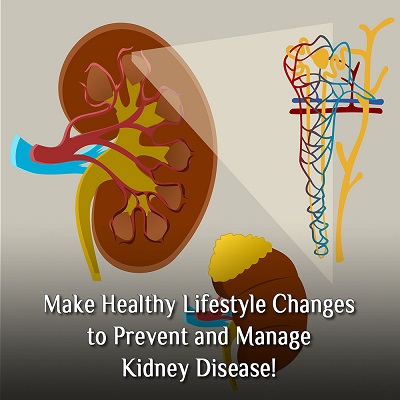 Kidney disease pertains to the loss of function of the kidneys, which can happen slowly over time. With damaged or diseased kidneys, your body can not remove wastes from your blood efficiently. The wastes build up and can lead to complications, such as high blood pressure, nerve damage, anemia, and weakened bones.
Kidney disease pertains to the loss of function of the kidneys, which can happen slowly over time. With damaged or diseased kidneys, your body can not remove wastes from your blood efficiently. The wastes build up and can lead to complications, such as high blood pressure, nerve damage, anemia, and weakened bones.
Symptoms, Causes and Risk Factors
Recognizing the symptoms and knowing the causes and risk factors of kidney disease can also help you prevent and manage it.
Kidney disease often has no symptoms in the early stages. If it has progressed, you may experience vomiting, frequent urinating (either through the day or at night), swelling in the ankles, loss of appetite and losing weight unexpectedly, and difficulty sleeping.
Kidney disease can develop due to some of the following reasons. They include insufficient blood flow to the kidneys, direct damage to the kidney tissues, suffering from an autoimmune disease or diabetes, or blood sugar levels or blood pressure levels are persistently high.
Other risk factors include age, family history of kidney diseases, obesity, smoking, and abnormal kidney structure.
Lifestyle Changes for Prevention and Management
Lifestyle changes can help you prevent developing kidney problems or slow down kidney disease progression. The changes can also prevent other health complications that result from kidney problems. Here’s what you can do.
Watch Your Weight and Diet
It’s essential to keep your weight at a normal and healthy level. One cause of kidney disease is high blood pressure, and excess weight can lead to that. It damages the blood vessels, so the kidneys can’t remove waste and excess fluids efficiently.
Certain foods, such as those rich in sodium, phosphorus, and potassium, can worsen your kidney disease. Dietary changes are necessary to prevent and manage chronic kidney problems. You should cut back on table salt and dietary protein to slow down the progression of the disease. They can elevate your blood pressure and cause swelling in the legs and abdomen.
When your kidneys aren’t working as they should, you should also minimize foods that are high in phosphorus and potassium. Phosphorus leads to bone weakness and an increase in fats in the blood. Potassium can build up in the body and result in an irregular heart rate.
Some foods you should avoid are dairy products, bananas, broccoli, processed meats, bread, chocolates and sodas and alcohol.
Some of the best foods to include in your diet are cauliflower, cabbage, bell peppers, onions, blueberries and pineapples, olive oil and garlic.
Manage Your Stress
Another cause of high blood pressure is stress and depression, which are common among patients with chronic kidney disease. Learning how to manage your stress and emotions well can improve your condition and make it easier to manage. It will also help you lower your blood glucose levels.
Try to incorporate relaxing activities into your routine. It’s normal to feel stressed and emotional, so don’t be too hard on yourself. Be intentional in taking control of your emotions.
If you smoke, don’t smoke in order to reduce stress. You need to quit smoking because cigarette smoke can further damage your kidneys and make the disease worse. It may not be easy to do, but you really need to think about quitting.
Another way to manage stress is to get quality sleep every night. Sleep lowers your blood pressure and blood glucose levels, allows your body to repair itself, and improves your immune system and overall well-being. It’s also essential for your mental health.
Work On Your Physical Fitness
Doing regular exercises can help you prevent further health complications from kidney diseases, such as heart disease and depression. Exercise strengthens your body, improves your immune system, boosts your mood, helps you sleep better, strengthens your weakened bones and more.
Early discovery of kidney disease can help you get the right treatment, make immediate lifestyle changes, and improve your health and life.






